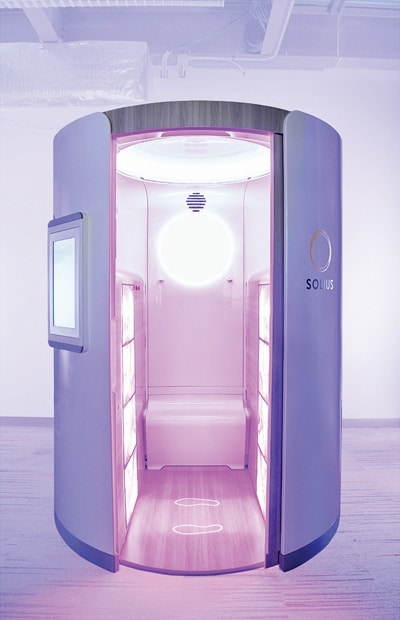Product Review
SOLIUS: New Technology to Help Vitamin D Deficient Canadians!
 Vitamin D is extremely important for human health. For decades, we’ve been supplementing foods with vitamin D to make sure we get enough of this vital nutrient. It is a hormone that the body needs to absorb calcium from the foods we eat, which is paramount for bone health and slowing down or preventing osteoporosis and rickets/osteomalacia. Current research is pointing toward the possibility that vitamin D is also important in many other aspects of health. Research shows that low vitamin D intake could be a contributor to Canada’s high rates of inflammatory bowel disease (IBD).1 Topical vitamin D might benefit those with psoriasis, a chronic inflammatory skin condition that causes patches of red or scaly skin that are itchy and painful.2 Vitamin D deficiency could also contribute to seasonal affective disorder and depression.3,4 Recent studies have even linked low vitamin D levels in the body to reduced lung function, increased airway inflammation and overall poor results in patients with asthma.5
Vitamin D is extremely important for human health. For decades, we’ve been supplementing foods with vitamin D to make sure we get enough of this vital nutrient. It is a hormone that the body needs to absorb calcium from the foods we eat, which is paramount for bone health and slowing down or preventing osteoporosis and rickets/osteomalacia. Current research is pointing toward the possibility that vitamin D is also important in many other aspects of health. Research shows that low vitamin D intake could be a contributor to Canada’s high rates of inflammatory bowel disease (IBD).1 Topical vitamin D might benefit those with psoriasis, a chronic inflammatory skin condition that causes patches of red or scaly skin that are itchy and painful.2 Vitamin D deficiency could also contribute to seasonal affective disorder and depression.3,4 Recent studies have even linked low vitamin D levels in the body to reduced lung function, increased airway inflammation and overall poor results in patients with asthma.5
Historically, the most readily available source of vitamin D has been the sun, but today many people work and live in parts of the world that get very little sunlight. In addition, we now know the risks of extended sun exposure, including sunburns, wrinkles, sun spots, and life-threatening melanoma, which means that many of us are reducing our time in the sun and making sure that we slather on sunscreen before summer days at the beach. While it is important to protect our skin from the sun’s damaging rays, we are also losing our primary source of vitamin D, natural production in our skin stimulated by specific light rays from the sun. Since vitamin D is extremely rare in non-fortified food (naturally occurring in fatty fish, but supplemented in milk and various processed foods), many Canadians are at risk for vitamin D deficiency if they don’t take supplements. This is especially true for individuals with IBD, because gut inflammation can decrease nutrient absorption from foods and supplements. Also, due to reduced hours of sunlight during the day, especially in the winter and as we go farther north, the sun’s rays are less effective in stimulating vitamin D production in our skin.
A company called SOLIUS has been working for years to develop technology that isolates and emits only the wavelengths of light that contribute to vitamin D synthesis, without the harmful UVA rays present in the sun’s energy. After a few minutes of exposure to these light waves, the body can synthesise the vitamin D that it needs, but without the damage that occurs from spending that time in sunlight and being exposed to all its wavelengths of light. According to SOLIUS, in one treatment session, averaging fewer than five minutes, the SOLIUS stand-alone self-care booth can trigger the body to produce more than ten times the vitamin D than can be made in an hour of midday summer sunlight. The SOLIUS device is being placed in convenient locations, and you can book treatments and manage your account through an app.
The SOLIUS booth solves the most common problem with supplements: inadequate absorption. Treatment in the booth is an effective method for individuals who are unable to absorb adequate amounts of vitamin D in the digestive tract, such as those with a digestive disease. With the booth, they can get all the vitamin D they need through skin synthesis.
When it comes to getting vitamin D from sunlight, it can be difficult to know how much time to spend outside. Factors such as geographic location, skin colour, skin type, and the amount of skin exposed can drastically affect the speed at which the skin synthesizes vitamin D. SOLIUS uses an algorithm to make sure that each user gets the right amount of time in the booth for their skin type.
Health Canada has recently approved the SOLIUS device, which opened its first location at BioPro Biologics Pharmacy in Vancouver, BC in September. They will be expanding to more locations in Canada in the coming months. Customers will be able to buy monthly memberships to access the machines as needed. To learn more about SOLIUS, go to solius.com.















